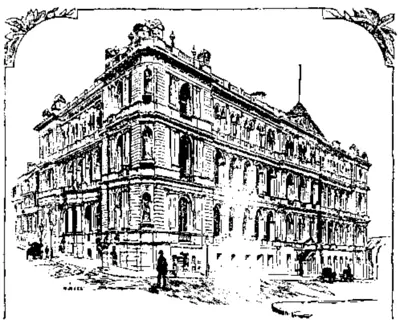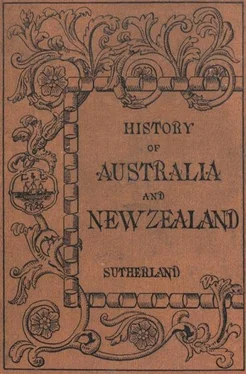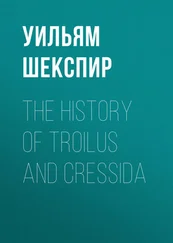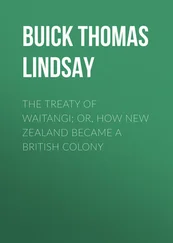Yet, the Secretary of State in England knew nothing of all this, and in 1843 he raised the price of land still higher, ordering that, throughout all Australia, no land should be sold for less than one pound an acre.
4. Immigration.—It is not to be imagined, however, that the English Government ever took to itself any of this land revenue. Every penny was used for the purpose of bringing immigrants into the colony. Agents in Europe were appointed to select suitable persons, who received what were called bounty orders. Any one who possessed an order of this kind received a free passage to Sydney, all expenses being paid by the Colonial Government with the money received from the sale of land. The Governor had the power of giving these orders to persons in New South Wales, who sent them home to their friends or relatives, or to servants and labourers, whom they wished to bring to the colonies. Now, Governor Gipps imagined that the land would continue to bring in as much revenue every year as it did in 1840, and, in the course of that year and the next, gave bounty orders to the extent of nearly one million pounds. But in 1841 the land revenue fell to about one-twentieth of what it had been in 1840; so that the colony must have become bankrupt had it not been that more than half of those who received bounty orders, hearing of the unsettled state of the colony, never made use of the permission granted. Governor Gipps was blamed by the colonists, and received from the Secretary of State a letter of sharp rebuke.
As for the immigrants who did arrive in New South Wales, their prospects were not bright. For a long time many of them found it impossible to obtain employment. Great numbers landed friendless and penniless in Sydney, and in a few weeks found themselves obliged to sleep in the parks, or in the streets, and, but for the friendly exertions of a benevolent lady, Mrs. Chisholm, who obtained employment at different times for about two thousand of them, their position would, indeed, have been wretched.
Mrs. Chisholm founded a home for defenceless and friendless girls, of whom nearly six hundred were at one time living in Sydney in destitution, having been sent out from home with bounty orders, under the impression that employment was certain whenever they might land at Port Jackson.
Gradually the return of the colonists to habits of prudence and thrift removed the financial distress which had been the primary cause of all these troubles. Land ceased to be bought at the ruinously high rates, and goods returned to their former prices.
5. Separation.—But these were not the only cares which pressed upon the mind of Sir George Gipps. He was entrusted with the management of the eastern half of Australia, a region stretching from Cape York to Wilson’s Promontory. There were, it is true, but 150,000 inhabitants in the whole territory. But the people were widely scattered, and there were in reality two distinct settlements—one consisting of 120,000 people round Sydney, the other of 30,000 round Port Phillip. The latter, though small, was vigorous, and inclined to be discontented; it was six hundred miles distant from the capital, and the delays and inconveniences due to this fact caused it no little annoyance.
There was, indeed, a Superintendent in Melbourne, and to him the control of the southern district was chiefly entrusted. But Mr. Latrobe was undecided and feeble. Though personally a most worthy man, yet, as a ruler, he was much too timid and irresolute. He seldom ventured to take any step on his own responsibility; no matter how urgent the matter was, he always waited for instructions from his superior, the Governor.
Under these circumstances, it was natural that the people of Melbourne should wish for an independent Governor, who would have full power to settle promptly all local affairs. In 1840 they held a meeting in a room at the top of the hill in Bourke Street, to petition for separation from New South Wales. But, next year, the Sydney people held a meeting in the theatre to protest against it. Here, then, was another source of trouble to Gipps; for, from this time, the colony was divided into two parties, eagerly and bitterly disputing on the separation question. Governor Gipps and Mr. Latrobe were not in favour of separation, and, by their opposition, they incurred the deep dislike of the people of Port Phillip. The authorities at home, however, were somewhat inclined to favour the idea, and as Gipps was necessarily the medium of announcing their views to the colonists, and carrying them into force, he became unpopular with the Sydney colonists also. No man has ever occupied a more trying position; and a somewhat overbearing temperament was not at all suited for smoothing away its difficulties.

Colonial Secretary’s Office, Sydney.
6. Representative Government.—In 1842 a meeting was held in Sydney to petition for representative government. The British Parliament saw its way clear to concede this privilege; and in July, 1843, the first representatives elected by the people assembled in Sydney. The new Council consisted of thirty-six members, of whom twelve were either officials or persons nominated by the Governor, and the other twenty-four were elective. It was the duty of this body to consult with the Governor, and to see that the legitimate wishes of the people were attended to. Six gentlemen were elected for Port Phillip; but residents of Melbourne found it impossible to leave their business and go to live in Sydney. The people of Port Phillip were therefore forced to elect Sydney gentlemen to take charge of their interests. However, these did their duty excellently. Dr. Lang was especially active in the interests of his constituents, and in the second session of the Council, during the year 1844, he moved that a petition should be presented to the Queen, praying that the Port Phillip district should be separated from New South Wales, and formed into an independent colony. The Port Phillip representatives, together with the now famous Robert Lowe, gave their support to the motion; but there were nineteen votes against it, and this effort was supposed to have been completely baffled. But Dr. Lang drew up a petition of his own, which was signed by all the Port Phillip members and sent to England. Nothing further was heard on the subject for some time, until Sir George Gipps received a letter from Lord Stanley, the Secretary of State, directing him to lay the matter before the Executive Council in Sydney; and stating that, in the opinion of the English Government, the request of Port Phillip was very fair and reasonable. An inquiry was held, the Sydney Council sent to England a report on the subject, and received a reply to the effect that steps would at once be taken to obtain from the Imperial Parliament the required Act.
The people of Port Phillip were overjoyed, and in 1846 gave a grand banquet to Dr. Lang to celebrate the occasion. But they were not destined to quite so speedy a consummation of their desires. The English Government which had given so favourable an ear to their petition was defeated and succeeded by another Government, to whom the whole question was new. Year after year passed away, and the people of Port Phillip began to grow impatient, and to complain loudly of their grievances. First of all, they complained that, although it was a well-recognised principle that the money received by Government for the waste lands of any district should be employed in bringing out emigrants to that district, yet the Sydney Government used much of the money obtained from the sale of land in Port Phillip for the purpose of bringing out new colonists—not to Melbourne or Geelong, but to Sydney itself. And thus, it was said, the people of Sydney were using the money of the Port Phillip district for their own advantage. And, again, the people of Melbourne complained that, although they were allowed to elect six members of the Legislative Council, yet this was merely a mockery, because none of the Port Phillip residents could afford to live in Sydney for five months every year and to neglect their own private business. The former of these accusations seems, so far as we can now determine, to have been unfounded; the latter was undoubtedly a practical grievance, though more or less unavoidable in every system of representation.
Читать дальше













